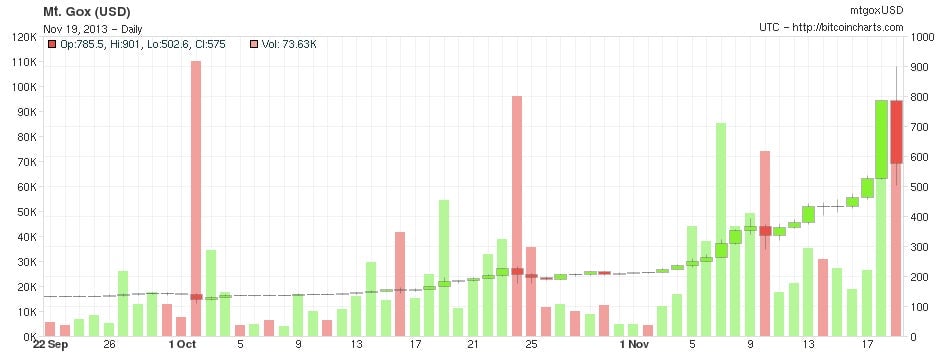If you’re talking about bitcoin, bitcoin is winning
When the US government turned a dim spotlight on bitcoin yesterday in a congressional hearing room, even Federal Reserve Chair Ben Bernanke took a moment on his way out the door to say that he had heard of the crypto currency and someday banks might use it.


When the US government turned a dim spotlight on bitcoin yesterday in a congressional hearing room, even Federal Reserve Chair Ben Bernanke took a moment on his way out the door to say that he had heard of the crypto currency and someday banks might use it.
Overnight, bitcoin traded on Mt Gox surged to $900 before plummeting to $550, rebounding to $680 at pixel time. That volatility ruined an office pool we set up here at Quartz (who could predict bitcoin’s peak before its next correction of more than 30%) and underscored the recent commotion around the networked currency, which seemed stable around $200, at least until the last few weeks:

What’s behind the shift? It’s probably not on the dollar side, and Izabella Kaminska has a good list of unsustainable supply shocks driving up the value of bitcoin: the haul of bitcoin seized by the FBI and taken off the market, an extortionate virus, outright theft, and high cost of “mining” new bitcoin, which become more difficult to decrypt as more are created. We’d add to those factors the purchasing pressure brought in by new markets in China, which is also making bitcoin more expensive.
But last night’s surge probably had more to do with the media itself, a reflection of bitcoin’s bubble-like properties: It has always soared with the attention of ink-stained wretches, benefitting from the interest—dare we say animal spirits—conjured by attention, negative or positive. And yet, absent media furor introducing new buyers to the currency, bitcoin’s practical value is still nearly nil.
That’s not to say bitcoin hasn’t earned the coverage; It fueled the rise and fall of illegal marketplaces thanks to its dubious anonymity—hiding your identity while using bitcoin makes sense in theory, but is tricky in practice. As its advocates correctly note, any new technology can be used for good or bad, and the savviest among them realize that the sooner bitcoin complies with basic anti-money laundering rules, the sooner it could achieve its more transformative potential. While proponents note that “tens of thousands” of places accept bitcoins as payment, it’s really not any more useful—yet—than regular money. Absent the novelty, it’s a speculative investment you can barter, and its value is entirely subjective.
But there’s promise for real use in the future, and that’s what made the hearing important. For now, converting currencies into bitcoin is cheaper than a bank or a credit card (pdf), even if it’s much less user-friendly. If the businesses trying to capitalize on those kinds of advantages in the bitcoin network succeed, bitcoin could be practical. But then it might be boring—and a little less pricey.